|
Today is the optional memorial of Sts. Cosmas and Damian, who were twin brothers born in the third century in Arabia. Both Cosmas and Damian became physicians, and in true Christian charity, refused to accept payment from their patients. During the persecutions under Roman Emperor Diocletian, the brothers’ renown in their Christian community made them easy targets. They were imprisoned and tortured by various means in an effort to force them to recant their faith, and after surviving most of these tortures while remaining true to Christ, Cosmas and Damian were finally beheaded.
What draws me to the story of Sts. Cosmas and Damian is not only their adherence to the faith while under excruciating torture, but also their unfailing generosity to those around them. They tended the sick in their community and did so without asking for or taking any monetary compensation. I like to think this was because they were often helping sick people who were also too poor to afford a physician in the first place. Generosity is a virtue that can easily be motivated by pride—we do good things for others, secretly hoping to get accolades or some kind of reward for being so self-giving. But I think generosity is really about giving to others —material, spiritual, or emotional—because you know the other will benefit, even if there is no compensation for you in return, or if (like Cosmas and Damian) you refuse to take any. Generosity is not only exemplified by a wealthy man donating money to charitable causes, nor only by going on mission trips to help those in poverty, nor is it demonstrated by showering poor children with gifts at Christmastide. We can cultivate the virtue of generosity in ourselves much closer to home and on a daily basis—just as St. Cosmas and St. Damian did. Generosity is lived out by a talented musician volunteering at his church to worship God in song, or by a mother who prepares and brings home-cooked meals to other families in her parish who have a new baby or have had a recent surgery. There is also spiritual and emotional generosity: being present and available to our siblings, children, parents, or friends as they struggle with transitions or discernment. When we engage in these acts of generosity, we serve Christ by serving others—even if it is not necessarily a sacrifice for us to do so. (Although I know for myself, the sacrifice that comes with being generous is striving to be selfless in my generosity and not to expect or desire reciprocation.) We are called to use anything that we have been given in order to glorify God. And what about those—presumably poor—people that Sts. Cosmas and Damian healed and treated? Who knows what kinds of generosity they were able to offer to their benefactors as a result of their encounter with the twin saints? Maybe they were generous in their prayer lives and interceded for the physician brothers. Maybe they were inspired by the generosity and faith of the two saints and went on to assist others in their community. Even if we cannot always be materially generous to each other, giving of ourselves in any capacity can cause a ripple effect of generosity throughout our communities. We can also learn to support and foster the generosity of others by thinking about how we respond when we are offered someone’s generosity, whether we asked for it or whether it was volunteered to us. Personally, I am working on asking for help or accepting generosity with humility. I know that I am less likely to help someone if they repeatedly protest my efforts or insist that I am doing too much, and therefore I try not to protest or downplay the good work that someone does for me. I try to remind myself that by serving each other, we are ultimately serving Christ. Questions for Reflection: Have you ever been the recipient of an act of generosity that changed your life? How so?
2 Comments
Contemporary Western culture seems to promote nothing but pride these days; it insists that only those who are proud, selfish, and disobedient can effect change or succeed in life. But salvation history and the lives of the saints tell us a different story—namely, that pride is the downfall of mankind, and that humility is what ultimately exalts us.
Humility is a difficult virtue to embrace because it is such a quiet one and is often mistaken for what it is not. In his Summa Contra Gentiles, St. Thomas Aquinas describes humility thus: “Truly, the virtue of humility consists in this, that one keep himself within his own limits; he does not stretch himself to what is above him, but he subjects himself to his superior.” Being humble does not mean debasing yourself and refusing to acknowledge that you have any gifts or talents whatsoever—and some would argue that in fact, such an attitude is actually hidden pride! The truly humble man understands that he is not the greatest at anything, and that while he is better at something than others might be, his gift ultimately comes from God and is to be used for the glory of God, not for personal accolades. The prime example of this is the Blessed Virgin Mary. She was a young woman without wealth or powerful connections, and yet her submission to the will of God altered the course of human history and opened the door for the divine Messiah to enter the world He would one day redeem. She did not attempt to argue that she was utterly unworthy of the grace bestowed on her, but rather submitted with her humble fiat, “May it be done unto me according to your word.” The truly humble man knows his own limitations—he submits to the authority not only of God and of the Church, but also to the legitimate authority of the government and the workplace. A humble man does not go looking for opportunities to gain power and prestige. He dies to himself for the sake of others—he harbors no resentment when others’ work is extolled while his goes unnoticed, and he uses those moments of humiliation to draw closer to Christ. The humble man continues to use his gifts even if no one but God is going to see or acknowledge them. And when his gifts and accomplishments are acknowledged by the world, the humble man turns that praise back to God instead of focusing it on himself. The humble man does not need to project an Instagram-perfect image of his life to the rest of the world: he accepts that he is a work in progress, can admit when he is wrong, and can accept criticism with grace. Sometimes true humility seems impossible to achieve. Because we are fallen creatures wrapped up in ourselves, we have to constantly work toward selflessness. One method of doing this is by praying The Litany of Humility. This prayer asks Jesus to deliver us from desires and fears fueled by pride—from the desire of praise, to the fear of being wronged. But the beauty of this litany is that it not only asks that we be freed from our pride, but it also asks for the grace to desire that others may be better than we are, loved more than we are, holier than we are. True humility is not downplaying our own roles, but is setting aside our own desires so that others can rise higher and do more for Christ than we ever could. It’s being the Andrew to someone else’s Peter and the Barnabas to someone else’s Paul—calling forth someone to the good or encouraging their potential, even if means that person becomes greater than ourselves. Matt Maher has his own take on the Litany of Humility in his song “Every Little Prison.” What I like about Maher’s version is that he adapts the prayer to be more recognizable for the modern Christian. Pride takes many forms in this era of Instagram followers, Facebook “likes,” and the 24-hour news cycle—we spend time “wondering if I am relevant and liked” and “wanting to be seen.” Ultimately, humility requires us to turn to God instead of other things and to trust in him, in his mercy and his wisdom, rather than becoming slaves to our fears of being judged, or of not being loved, or of having to let go. By praying for freedom from the prisons created by pride, may we live more confidently in the love of God and in doing his will. “Jesus returned from the Jordan and was led by the Spirit into the desert for forty days, to be tempted by the devil...” - Luke 4:1-13
In each of the Church’s Liturgical Seasons we have an opportunity to examine ourselves and reflect on different aspects of Jesus’s life. During Lent we create a space to reflect on His suffering and sacrifices. In today’s Gospel reading the Spirit led Jesus into the desert. For forty days Jesus lived in the wilderness, and faced the devil’s temptations. He was tempted with pride, power, and popularity; however, Jesus knew that He was called to follow God’s will and resist the empty promises the devil offered. I find comfort that the Holy Spirit led Jesus into the trial. The forty days were meant to prepare Jesus for the work that was to come, and a part of that preparation included temptations. Jesus relied on His knowledge of the scriptures and combatted the temptations with Truth. Turning a stone into bread seems like an innocent action, but Jesus knew that the temporary satisfaction would be empty and in defiance of God’s will. Jesus understands what it means to face temptation, and in His resistance provides a model of following God’s will that we should all ascribe to. Jesus was tested, and responded without sin. When I find myself facing a trial, I can draw comfort in the knowledge that the same Holy Spirit that led Jesus into the wilderness is in me. In His resistance in the wilderness, we have a foretaste of Jesus’s victory to come. At Easter we celebrate Jesus’s victory over death; in the meantime Lent provides us with a time to fast and prepare our hearts for the inevitable temptations of the world. Lent provides us with the opportunity to spend forty days in our own “wilderness”, fortifying our own hearts through sacrifice and prayer. FOCUS: COMMUNITY Throughout Lent we focus on all that Jesus has done for us. In today's Gospel we see that Jesus resisted each temptation, not just for Himself, but for us. Each of the temptations the devil proposed were designed to distract Jesus from His humanity. Each temptation involved Jesus using His divinity for personal gain and separating Himself from the human community. The temptation of individualism is something that we are all called to resist. The Lord created us as social beings with a responsibility to care for one another. WHO INSPIRES YOU TO SERVE? My Mom has always been a model of service I aspire to follow. She embodies the principle of placing others first, stressing to me and my siblings that “where your treasure is your heart will also be.” Mom’s treasure is rooted in the love she has for our community, and it is important to her that she actively invests her time to show the love. It could be as simple as caring for our school garden, or as involved as organizing our Church’s homeless outreach ministry. Mom has always found a way to make time for the causes that matter to her, and in doing so has shown the importance of committing time and resources to love others in her care for all of God’s Creation. PRAYER: Lord, you created us to love and worship. Help me cling to the truth that I am Yours in the midst of trials. When I walk through the valleys help me remember the joys from the mountain tops, and place my hope in the knowledge that Your will is for my good. Stir in me a heart that longs to discern Your will. Help me to work Your justice rather than personal gain every day of my life. Bless our bodies for Your service, and our service for Your Glory. To view the entire 2019 Lenten Guide, please click here. For more Lenten resources, please click here. Mara Scarbrough, Bon Secours Volunteer Ministry The National Day of Prayer formally began in 1952, but the United States has a history of prayer going back much further. There was much controversy between the founders of our nation about the scale, matter, denomination, and exercise of religion in the public sphere. We do not live in an explicitly Christian nation. Our Founding Fathers were a diverse group of people whose spirituality and religiosity fell on a spectrum ranging from explicitly religious to the more ambiguous. Most were Deist, meaning they believed in a God, but that he was a distant being who did not interact with his creation. Like the idea of the clock-maker, who builds a piece, sets it, and lets it run its own course. As Catholic Christians, we believe in a personal God; a God who wants to be so involved with us and our lives that he became flesh and dwelt among us. But what does that mean for us as American Catholics? I think we are called to be Catholics who live out our faith in the context of an American culture, just as Catholics in France live out their faith in the context of French culture. The virtues our society recognizes, such as care for the poor, can be lived out in a deeply Catholic manner. When we are asked why we care for the poor, our response as Catholics is that humans have an inherent dignity which makes them worthy of care. Our national pride in education and scholarship can be purified with a holistic understanding of the true, good, and beautiful. The love of nature by many in our culture can be viewed as the encounter of the person with the Creator of nature. As Catholics and as citizens, we are called to own our responsibility, our duty of stewardship, to this country in which we live. The concept of stewardship is an ancient tradition in the Church, but is often rarely mentioned beyond the context of tithing and parish finances. The USCCB begins their page on stewardship with this passage from 1 Peter: "As each one has received a gift, use it to serve one another as good stewards of God's varied grace." We as Catholics have been given gifts that other Americans, our fellow citizens, may not have. We have a history and a tradition of prayer, of calling upon God for guidance and protection collectively and personally. We have a community that encourages us to live out the love of Christ for our neighbor. As Catholics, we are called to lead the way in helping those in need, such as young women facing unexpected pregnancies, veterans with mental health issues, and our youth who have a deep longing for the truth in their hearts. Our National Day of Prayer is a day set aside for peoples of all faiths to come together and ask the Almighty for guidance. And our Father is a good Father who cares for his children. It is through his people, the Church, that he acts. As Servant of God Archbishop Fulton Sheen once said, “Show me your hands. Do they have scars from giving? Show me your feet. Are they wounded in service? Show me your heart. Have you left a place for divine love?”I know we live in what feels like a deeply turbulent time in our country and world, but if we let fear rule us then we have no room for love. Is it really the large institutions that determine our national fate, or the many actions or inactions of everyday people in ordinary situations? In The Hobbit, J.R.R. Tolkien had Gandalf remind us, “Some believe it is only great power that can hold evil in check, but that is not what I have found. It is the small everyday deeds of ordinary folk that keep the darkness at bay. Small acts of kindness and love.” Let us go forth in prayer, with Christ in our hearts, and love our neighbors as He taught us. Question for Reflection: How can your faith infuse your daily life and inspire the way you live and act? For more resources on Faithful Citizenship, please click here. I spent much of my young life unintentionally (and, if I’m being honest, at times intentionally) ignoring the Holy Spirit. I recognized that the Holy Spirit existed, was the third part of the Trinity, and was an important enough part of our faith that we referenced Him every time we made the sign of the cross. As I grew in both age and maturity, I began to recognize that there were countless places in my life where the Holy Spirit was prompting, guiding, and protecting me; yet I also began to recognize how often I missed it. We live in a world bogged down by noise, pride, and distractions that offer us false freedom. The reality is that the Holy Spirit is constantly pursuing us. He is pursuing us through our relationships, in our work, and, most especially, in our prayer. The Holy Spirit is breathing life into what we thought to be dead and is equipping us to receive Him as what Jesus promised us— the Advocate. It is the Holy Spirit that encourages us to be bold in speaking truth and compassionate in listening to those that need it most. Most of all, the Holy Spirit is offering us— and calling us to—a life of freedom. For the Christian, we know that there is true freedom offered to us that the world does not understand. More than anything, God desires for us to first experience the Holy Spirit and subsequently live a life filled with fruits of the Holy Spirit. In a 2014 address, Pope Francis said: “Let yourselves be guided by the Holy Spirit, in freedom; and please, don’t put the Holy Spirit in a cage!” When we put the Holy Spirit in a cage, we are missing out on the freedom that God wants for us. As men and women seeking to follow God in a world that seems so devoid of Him, may we be found ready to be pursued by the Holy Spirit, ready for a life of true freedom. Question for Reflection: How do you see the Holy Spirit pursuing you throughout your life up to this point? Prayer, fasting, almsgiving. At the heart of these Lenten pillars, we hear a call to go out and, as Pope Francis reminds us, encounter. In our prayer, we lift up the needs of our global family. Through our fasting, we empty ourselves, giving up something to make room for the needs of another. And in our almsgiving, we pour out our own gifts and resources so as to lift up those who are in need, near and far. Lent is a time to remember that we are all part of God’s one human family, and that means we have responsibilities to one another. And we come to understand and fulfill those responsibilities by building a culture of encounter. To build a culture of encounter, we must start from within ourselves, from our personal call to discipleship. God knows our true selves, desiring that we, too, discover the person God has called us to be. Through prayer, we encounter ourselves before God; we see ourselves as God sees us. And we realize that God delights in every member of our human family because God is truly present in each of us. Jesus reminds us, “You shall love your neighbor as yourself.” To love another, we must come to know our own selves, our own hurts and triumphs, our own joys and challenges. What begins as an interior encounter necessarily goes beyond ourselves, challenging us to live in solidarity with people we may never meet. How can we hope to go to the margins, to accompany those who are most vulnerable and in need, if we haven’t properly wrestled with our own vulnerability, our own need? Only then can we recognize that each person we encounter can share with us some unique insight about our world, about ourselves and, ultimately, about our God. We meet Jesus in the desert, a time of introspection and discernment before he begins his ministry. What has he gone there to accomplish? Luke tells us that Jesus “was led by the Spirit into the desert for forty days, to be tempted by the devil.” There he fasts and prays—and the Enemy takes that opportunity to tempt Christ with those temptations we each encounter daily: material comfort, honor, and pride. Jesus responded by trusting in God, by emptying himself of pride and power and ultimately rejecting the invitations of the Enemy. We, too, can better understand where we are broken and turning away from whom we are called to be by following Jesus’ example and encountering ourselves through prayer and fasting. We may not go into a desert for forty days, but we can and should take the forty-day invitation of Lent as an opportunity to reorient our lives, examining how we are living in relationship with God and our neighbors. That might mean coming to terms with troubling or disappointing truths. Can we, like Jesus, radically reject the offering of power, of influence? We all want glory, praise, a pat on the shoulder, but as Jesus turned away from the Enemy’s offering, so too must we. And then, where do we turn? We go to the margins with humility and compassion. Only by encountering ourselves can we then encounter our neighbors and build up that culture of encounter. This Lent, let us commit ourselves to encounter one another anew, to encounter Christ anew. Let us commit ourselves to giving more readily and more freely—whether of our time, our resources, or our finances. Let us commit to forty days of transformation, ready to encounter Jesus in the desert, and to commit to bearing whatever fruits that encounter sows. Continue reflecting with CRS Rice Bowl by downloading their app or visiting their “Stations of the Cross Digital Retreats” page. When the disciples saw [Jesus] walking on the sea they were terrified. “It is a ghost,” they said, and they cried out in fear. At once [Jesus] spoke to them, “Take courage, it is I;* do not be afraid.” Peter said to him in reply, “Lord, if it is you, command me to come to you on the water.” He said, “Come.” Peter got out of the boat and began to walk on the water toward Jesus. But when he saw how [strong] the wind was he became frightened; and, beginning to sink, he cried out, “Lord, save me!” Immediately Jesus stretched out his hand and caught him, and said to him, “O you of little faith, why did you doubt?” -Mt. 14:26-31 I often close my eyes and am transported to the rough waters. I look down at my shaking feet and trembling hands. Only moments ago, I had boldly called out to my Master, “Lord, if it is you, command me to come to you on the water” (Mt. 14:28). My quick strides out of the boat are now feeble in the choppy waters. I begin to sink, “Lord, save me!” (Mt. 14:30). I find myself reflecting on this passage in moments of confusion, storms, and desolation. Peter’s example gives me great consolation, for it reveals the rough fisherman’s humanity. Peter– the impetuous, bold, and quick-tempered disciple who often speaks too quickly or acts without thinking. He requests something impossible by human standards only to be affirmed to “come.” His pride must have crept up quickly as he began an endeavor worthy of bragging rights among the other disciples. It was a lack of faith in Christ, an over-estimation of his own abilities, and a doubt in Christ’s power that led to Peter’s downfall. He began to sink, crying out, “Lord, save me!” Have you ever cried out these words from the depths of your heart? I say those words repeatedly throughout my life whenever I’ve felt myself sinking in choppy waters. The entire Christian life a response to God’s invitation to step out of the boat. I have learned more deeply in this past year that this invitation is the only one that I need to respond to if I want to attain sanctity, if I want to walk on water. I, like Peter, am so human. And yet, Jesus beckons me, he beckons all of us, to walk on water. This gives us hope, for we do not need to be perfect to answer his invitation. We need only to have faith and to be willing to answer when he proposes something different than what we think we need. The Lord never beckons us to impossible waters. While the journey towards sanctity would be impossible on our own, God gives us the grace, the sacraments, the Church, the community, in a word, the extended hand that we need to answer his invitation to “come” (Mt. 14:28). God knows we may never be fully ready to step out of the boat and complete the journey on water towards him. It is for this reason that Jesus calls us with an outstretched hand. Sometimes his hand seems further away than we can handle, but God is never out of our reach. “Come,” Christ says to us all, “experience my glory. Come, live in my love. Come, be like me. Come, walk on water.” Will you step out of the boat? Have you ever been called frail before? I was once by a priest in a homily; the word was unsettling. As the priest slowly enunciated the words, “You. Are. Frail” a flood of various thoughts rushed over me. Mainly, I was proudly scoffing and thinking, “I’ve got this. I have my spiritual life together. I mean, I am one of the few Catholics that goes to Mass every Sunday…That says something, right?”
Frailty. The word itself seems weak, puny. In reality, those thoughts of mine, the “Oh I got this” or the “I’m not doing so bad”—don’t they reveal my frailty, my weakness? They reflect a mindset rooted in pride that doesn’t think that I need Him. Perhaps more unsettling are Paul’s words to the Corinthians. Paul writes about begging God to remove a thorn in his flesh, to which God replies, “My power is made perfect in weakness.” Paul continues in his Letter, “I will all the more gladly boast of my weakness, that the power of Christ may rest upon me. For the sake of Christ, then, I am content with weaknesses, insults, hardships, persecutions and calamities; for when I am weak, then I am strong!” Doesn’t the world tell us that we need to have our act together—the complete opposite of Paul’s words above? Why would we boast in the things we are not good at? The saints are saints because they know they are weak sinners, and yet they never became complacent. They boasted in their weakness while asking God for the grace and love to grow in the midst of it and didn’t attempt things on their own. They were receptive to the Lord’s guidance, His divinity. Our Holy Father, Pope Francis, also exhibited this “boasting” at the beginning of his papacy when he said, “I am a sinner…but I trust in the infinite mercy and patience of our Lord Jesus Christ.” In Scripture, we are compared very often to sheep. Sheep need the shepherd to survive. They have been known to graze on the same grassy area, gnaw the grass to its root, which kills the grass, and eventually starve themselves to death due to the lack of nutrition. The shepherd must therefore guide the sheep for survival. Jesus, the Good Shepherd, guides us. Will we let him or will be remain complacent? The real problem that I encountered in the pew that Sunday was this complacency. Like the sheep, I was gnawing at the same grassy area, stubbornly thinking I was getting the nutrients and food I needed. I, like Pope Francis, must recognize that I am a sinner—that I am frail and I need Him. Only this will allow me to boast in my weakness. When I acknowledge that I am weak, I am acknowledging my need for Him evermore. When I acknowledge my dependence on Him, He then can give me the strength I need to make it through the day—to accept His Love in my human limitations. If we are to journey on the beautifully romantic and stretching road to holiness, we must be careful of feeling too comfortable while gnawing the same patch of grass. Instead, we are called to boast in our weakness and invite the Lord to move in us, to change us. Change and growth are uncomfortable, but necessary to the Christian life. For we are frail, and yet we boast in the sheepishness—knowing our Shepherd is strengthening and guiding us along the path. The quickest and surest way to be led by the Good Shepherd is by letting Him consume us in the Holy Eucharist. There, we are united with our Shepherd, held in His gentle and loving arms close to His Sacred Heart through the good and the bad. There, we will find true comfort, there we will be able to join St. Paul and see our frailty turned into true strength! Elizabeth Pawelek is pursuing her Master's in Leadership for the New Evangelization at the Augustine Institute in Denver, Colorado. We are about two weeks into our Lenten sojourn, and I’m not sure about your experience so far, but I know that it has already been a challenge for me. And that’s good! I wanted this Lent to more closely unite me to the Cross of Christ, not just for these forty days, but beyond this season, and God is answering this prayer in ways that I could never expect. In fact, he is delivering me from my own crosses so that I may know joy through this suffering.
So far, I’ve been able to take away two important lessons from my Lenten journey so far:
Life is hard. Our days are filled with many demands, and sometimes we fail to meet them. People will disappoint us. We may hurt others by our words or actions. We find ourselves exasperated, or at times feeling hopeless. But the one who hopes in the Lord knows that all of these trials of being human bring us to the Cross and teach us sacrificial love. This weekend at mass I was told, “Lent is a school of charity. Life is a school of charity” (Msgr. Andrew Wadsworth). As we navigate these crosses, God is literally stretching our hearts to be open to love – the love of the Cross – so that when we reach heaven, our hearts are like Christ’s sacred heart. And if he stretches our hearts through pain and sorrow, imagine how much God stretches our hearts through hope and joy! Through every trial and every gift we are being molded to become more Christ-like, capable of infinite love. If we could truly fathom this infinite love that God is preparing us for, we would live life on our knees in awe of the Cross. Truly we can say that life is a school of love, a school of charity. The readings today teach us how we can plant our roots to let the Lord more fully direct our lives. We are consistently given the image of a tree whose roots are planted near running water. This tree’s leaves never fade, and in even drought, it still bears fruit. For me, this tree represents my cross, whose confidence must rely solely in the Lord. God can only keep my leaves evergreen if I live off of his waters, God will perform miracles in my life if I let him. Truly letting go of my pride and independence is so hard, yet extremely humbling. It truly takes confidence and prayer. In this school of charity, I’ve learned that even the simplest of prayers can help me submit my cross to God each day: “Multiply my time, Lord,” or “Let me see you where you need me to.” When I say these prayers and trust God to fulfill them, he does. He’s stretching my heart to know his love. He carries my crosses for me. Truly, I am a mere student in this school of charity. As you pray today over your takeaways from Lent so far, I pray that you come to find peace in how the Lord is trying to carry your cross through His school of charity, and that you call upon the grace to let him do so. I pray that you reflect on where your tree is planted and that you want to live by God’s living streams. Ultimately, I pray that you know how loved you are. You are so loved that God is stretching your heart so that you may become more like him. He wants you to know infinite love, who is our Lord Jesus himself. “I pray that you, being rooted and firmly established in love, may be able to comprehend with all the saints what is the length and width, height and depth of God’s love.” – Ephesians 3:17-18 Alyce Anderson is a teacher in Washington, D.C. Have you ever wanted to start over? “My diet starts on Monday...” “My New Year’s Resolution of not drinking soda failed, so I’ll give it up for Lent in a couple of months...” “I’ll start not hitting the snooze button on the first of the month.”
A fresh start... Our society always seems to be longing for a “fresh start.” There’s a sense of pride and victory when we can commit to a new beginning. But why is it so difficult to remember that as Christians, by virtue of our baptism, we are called to a fresh start each day with Christ? Our first reading today reminds us that we are members of the Body of Christ our baptism. “For in one Spirit we were all baptized into one Body… and we were all given to drink of one Spirit” (1 Corinthians 12:13). The vocation we receive in baptism is not to lay dormant in our hearts; rather, it is a vocation that we should choose to live out each day. When we choose to intentionally live out the promises of our baptism, we are renewed by its waters and are given a “fresh start” to live as the Christians we long to be. In Christ’s love, it is never too late for a new beginning. We see this in today’s Gospel reading, when Jesus brings the only son of a widow back from the dead. And do you know what his call to new life was? Jesus said, “Young man, I tell you, arise!” (Luke 7:14). This is our call, too! Jesus says this to our hearts, “Young man, I tell you, arise!” “Young woman, I tell you, arise!” The fulfillment of our call is the way we live out the radical nature of our baptism. The Christian life is not easy, but that is why we are called each new day to “arise” and fulfill the promises of our baptism, “[serving] the Lord with gladness” (Psalms 100:2). What are you going to do today as Jesus calls you to “arise?” This is your fresh start. It may not seem like the perfect day to begin anew, but as Christians we know that today–this ordinary day–has been given to us by God and we are being called to “arise!” You have been called, you have been chosen. So “arise,” my friend, and let this new day be a new offering to our Lord. We can begin this fresh start by praying a Renewal of our Baptismal Promises, that explicitly remind us of our call as Christians. Please join me in praying this today. The Renewal of Baptismal Promises Taken from the Roman Missal, Third Typical Edition Do you renounce Satan? I do. And all his works? I do. And all his empty show? I do. Do you believe in God, the Father almighty, Creator of heaven and earth? I do. Do you believe in Jesus Chris, his only Son, our Lord, who was born of the Virgin Mary, suffered death and was buried, rose again from the dead and is seated at the right hand of the Father? I do. Do you believe in the Holy Spirit, the holy Catholic Church, the communion of saints, the forgiveness of sins, the resurrection of the body, and live everlasting? I do. And may almighty God, the Father of our Lord Jesus Christ, who was given us new birth by water and the Holy Spirit and bestowed on us forgiveness of our sins, keep us by his grace, in Christ Jesus our Lord, for eternal life. Amen. Alyce Anderson is a recent graduate of Texas A&M University. She is currently pursuing her Masters in Secondary Mathematics and Special Education while teaching at a local school in Washington, DC. From the very beginning of my schooling, I can remember the constant encouragement of my family to do better – to strive for the highest goals. I’m sure we can all remember being lectured about the importance of getting good grades, reading at a higher level, the absolute necessity in life for multiplication tables, etc. This led to being told how important it is to go to college, to do well in school, to graduate with a high GPA – with honors – magna-summa cum laude – I’m sure many of us have heard all this before, or are hearing it right now. These achievements are indeed important – they lead to us getting good jobs or moving on to higher learning. Without these accolades it would be difficult for us to achieve our goals.
Today, many of us are in an environment where we feel like we need to constantly achieve more – to gain notoriety, a high social status, or a promotion at work. While it’s always fine to strive for something, it is important to remember that it’s not all about being noticed – or being the best. There is so much more to life than trying to get to the top of the heap. In today’s Gospel, the disciples asked Jesus, “Who is the greatest in the Kingdom of Heaven?” (MT 18:1) Jesus presents the disciples with a child, instructing them that unless they become like the children, they will never enter the Kingdom. Jesus furthermore says, “Whoever humbles himself like this child is the greatest in the kingdom of heaven.” (MT 18:4) We are tasked to remember that being humble is an essential part of life. We shouldn’t be boastful or prideful when we succeed, we should be grateful for the opportunity to make a difference and help others. We should take a cue from our Holy Father, who has made the choice to actively be as humble as he can in word, deed, and action – even though it is not required of him. When we can, we should always choose to be humble, to allow others to go before ourselves, and to remember that if we want to enter the Kingdom we should think back to our childhood – where we were always looking up and not looking down. Chris Pierno is the Media & Marketing Manager for the Catholic Apostolate Center I spent my spring break in Diriamba, Nicaragua, living with abandoned special-needs children. The experience taught me more than I could ever say or write, but one person’s words and actions are still fresh in my mind.
Our guide Julia (pronounced who-lee-uh) was a no-nonsense woman who spoke heavily accented English. Understanding her was a twofold challenge. First was fighting through her accent, but second was following her train of thought. Julia was full of grand ideas; language was often an inadequate vehicle for the love she shared with everyone she encountered. Her sentences could ramble and her ideas could blur together, yet the message always rang true. Julia was the quintessential guide. She got us where we needed to go, naturally, but was always there to fill in the necessary information we lacked. She helped us understand Nicaragua in ways we could not have otherwise. Julia taught us something about wealth. When we saw families living in shacks unfit for an American dog, she taught us to see what they had, not what they lacked. Poverty forced families together, she said. Multiple generations lived together in the same home, spending their lives on the same minuscule pocket of land. We have technology, but how often did we see our families? How much did we truly love our closest relatives? Our hearts ached for the poor, but she reminded us of the powerful love coming from their poverty. Julia taught us about discipline. She worked alongside an amazing staff at Mustard Seed Communities, the organization that ran the orphanage where we stayed. Blessed with limitless patience, these women worked tirelessly caring for children who had no one else to care for them. For this to be possible, some level of order had to be maintained. The last day we were there, multiple kids were kept inside, unable to play with us or the other children. When it came time to say good-bye, Julia had to hold firm and keep the kids inside. Love is not always nice, and allowing the children free reign was no favor to them. Julia taught us about pride. Anywhere we went, she glowed as we took in the beauty of her country. Surrounding the poverty and hardship were spectacular views in the mountains, sandy beaches and a volcanic lake that was nothing short of paradise. The homes were bright and clean. No one had much, but what they had was theirs, and that meant something to them. Anytime we ate, she spoke of the national cuisine. They don’t cook with spice, they add it at the end, she said. She spoke of their national cheese, a salty, creamy white cheese served with plantains. She spoke of their national drink, the Macuá, which was a mixture of white rum, orange, guava and lemon juices. Her pride never boasted, only sought to show the beauty and the good in her country Julia taught us about love. Love is simple, yet strong. It is not always nice, but enables true care. It does not boast, but carries itself confidently. Love extends to every facet of life and extends to everyone encountered. Julia taught us all of this less with words and more with actions. She was ordinarily heroic, doing great things in simple ways. Time will erode many of the memories formed in Nicaragua, yet Julia will stand the test of time. I went to Nicaragua to help those in need, but I left finding I was in as much need as the people of Nicaragua, and most of those lessons came from Julia. Zack Lemon is a student at Ashland University in Ashland, Ohio and a student leader for the Campus Ministry Leadership Institute, sponsored in part by the Catholic Apostolate Center. This post originally appeared in The Collegian, the student newspaper of Ashland University. They came to Capernaum and, once inside the house, he began to ask them, “What were you arguing about on the way?” But they remained silent. They had been discussing among themselves on the way who was the greatest. Then he sat down, called the Twelve, and said to them, “If anyone wishes to be first, he shall be the last of all and the servant of all.” Taking a child he placed it in their midst, and putting his arms around it he said to them, “Whoever receives one child such as this in my name, receives me; and whoever receives me, receives not me but the One who sent me.” – Mark 9:33-37
Here, we have another classic example of Jesus’ disciples screwing up. I love them for that. In my struggle to figure out how I can better receive Christ, the knowledge that these great saints also constantly screwed up keeps me from spiritual perfectionism, and instead lets me focus on growth. In this particular case, the disciples failed to discern that concern for the welfare of others needed to trump their own ambition. In my circles of Catholic emerging adults, we talk a lot about discernment, and there is an ever-growing area within practical Catholic spirituality about how to practice discerning well. We discern marriage or religious vocation; we discern where to begin a job search; we discern whether even to begin that job search or go on for more education. We discern our roles within changing friendships. It’s so common that among my friends, discernment is even tossed around as a joke, such as when we “discern” whether we should order another pizza for the game watch party. However, what struck me in this Gospel passage is the fact that the disciples clearly had to practice something else before moving on to discernment. The prerequisite to discernment must be a well-formed conscience. The disciples had no idea what they should have been talking about along the road, but they were ashamed when Jesus asked what their conversation was – they knew, deep down, that who was the greatest among them certainly wasn’t a question worth their consideration. Was that gut feeling present when the conversation started? The Catechism of the Catholic Church §1779 explains the need for introspective vigilance, and quotes the advice of St. Augustine: It is important for every person to be sufficiently present to himself in order to hear and follow the voice of his conscience. This requirement of interiority is all the more necessary as life often distracts us from any reflection, self-examination, or introspection: “Return to your conscience, question it… Turn inward, brethren, and in everything you do, see God as your witness.” (Saint Augustine) If we are truly going to discern as often as we profess about matters great and small, we need to attend to this interiority. Prayerful discernment, or choosing between good things, is hard enough. It becomes much harder if you can’t see what is not of God and can’t rule that out immediately. Today is the memorial of Teresa of Avila, a great contemplative. She certainly believed that when you don’t distract yourself with things that aren’t worth filling your mind, that’s when you can hear God. In Teresa’s meditation on the Song of Songs, she warns her religious sisters against “false peace” with oneself - a “peace” that anesthetizes and atrophies the soul. She took the time to identify nine kinds of false peace, which can stymie our growth into the disciples that God created us to be and which Christ calls us to be. We are each like the disciples in this Gospel: imperfect, but called by Christ to recognize when we could have done better. When we recognize the wrong questions, we can begin to discern which are the right ones. The disciples didn’t remain at peace with their pride, and grew into some of the greatest servants of others. For myself, I pray that I can stay away from the false peace that would make me complacent with the children and adults whom I serve as a parish director of religious education. Lord, help me to receive You in them. Laura Berlage serves as Director of Religious Education for Incarnate Word Parish in the Archdiocese of St. Louis. 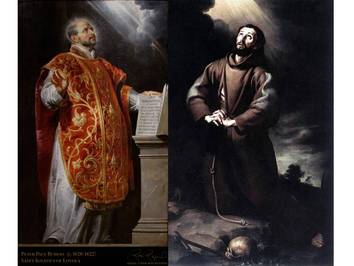 This new pope literally had me at “hello” — unimposing, humble hand wave from the balcony and all. And this humble legacy continues; Pope Francis is turning heads left and right of both the “left” and “right,” consistently shunning the traditional trappings the papacy has offered for hundreds of years. His latest press-stunner: he will not be sleeping in the papal apartments of the Apostolic Palace, but rather in the Vatican guesthouse—a less luxurious living arrangement that puts him in community with those who will be working with and for him. As a Catholic, I’m shocked and amazed. As a Franciscan (and a Capuchin to boot!) I’m humbled and inspired. “He’s out-Franciscan-ing the Franciscans!” I’ve heard people say. And I must agree. This new pope is certainly living up to his namesake—trading the regality and legality of the position and opting for, in my opinion, something a little more expected of a “servant of servants.” Fortunately for us “fledgling Franciscans” in studies, we are being given a great example from our new leader. I’m not lying when I say that this pope has made me reflect on my own life of simplicity and ask some tough questions that I can’t necessarily provide ready answers for at the moment. This is how I know when someone is dripping with authenticity: when the example they give calls my own integrity into question. I just didn’t think it would be a Jesuit that would do it! I have to remind myself that while this pope chose the name Francis (and is living up to the title!), his colors as a Jesuit are shining more true than ever. My experiences with Jesuits are limited, but what I have experienced has been nothing short of impressive. The Jesuits of St. Joseph’s University in Philadelphia heard my confessions as a bright-eyed Capuchin postulant with utter compassion and sensitivity. The Jesuit Retreat House in Parma, Ohio have led myself and thousands of others on spiritual journeys through retreats and programs—sharing with the Church the wealth of Jesuit spirituality and discernment. My uncles and cousins who were educated by them in Toledo, Ohio boast of their Jesuit education with a glowing pride, as I’m sure others can attest to throughout the United States in the plethora of Jesuit institutions of learning. Their missionary zeal speaks for itself in their martyrology. It’s a life given over in love for the sake of the people. Needless to say, these men are made of the stuff of saints—and I constantly remind myself that I’m selling this guy short when I boast of his Franciscan spirit and put aside his life-long service and evangelical influence as a faithful Jesuit. Our new pope bears the name Francis, loves the poor, lives simply and humbly, and upholds the teachings of the Church—and every one of these decisions of his grow fruitfully, no doubt, from a life given to Christ and His Church in the Jesuit tradition. This pope has, ironically, helped me realize less of what separates Francis of Assisi and Ignatius of Loyola and more of what they have in common: a burning desire to serve the poor of this world in charity and humility. Who could have figured that it would take a Jesuit to show me how to be a real Franciscan! Brother Brian Stacy, O.F.M. Cap. is a Capuchin Franciscan from the St. Augustine Province and is currently studying at The Catholic University of America.
|
Details
Archives
July 2024
Categories
All
|
About |
Media |
© COPYRIGHT 2024 | ALL RIGHTS RESERVED

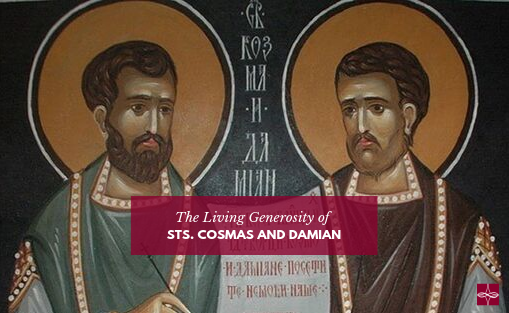

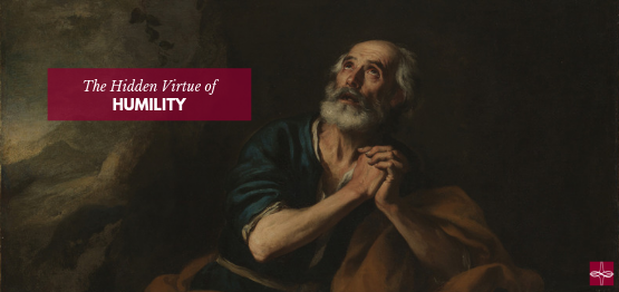

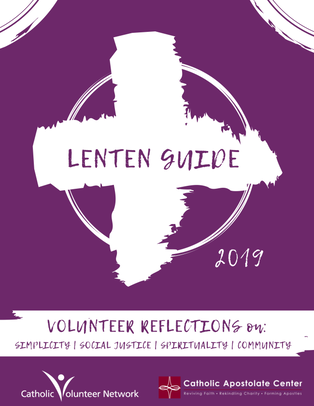
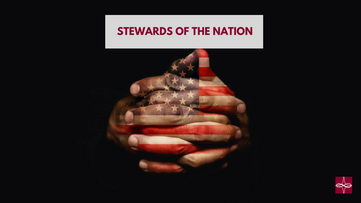

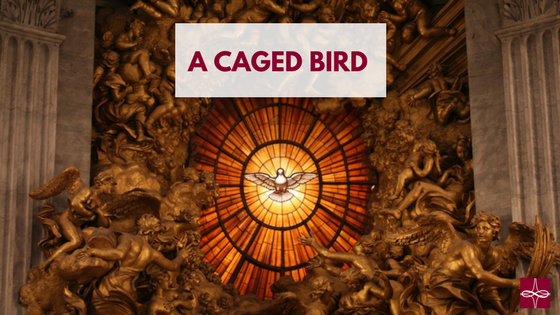

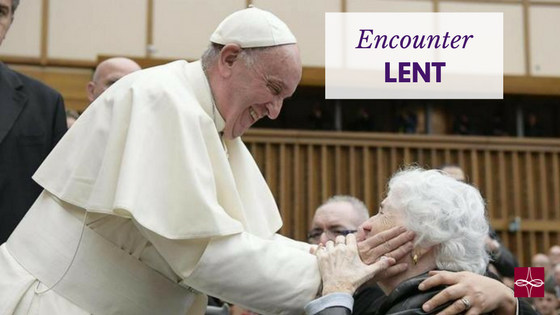



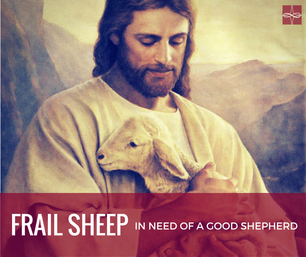
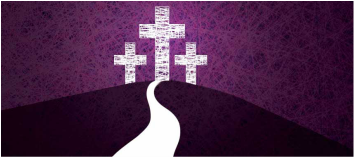
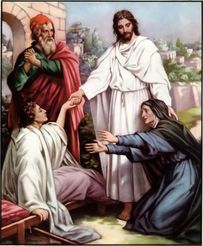


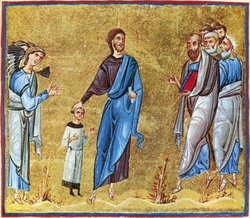
 RSS Feed
RSS Feed